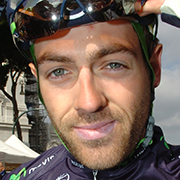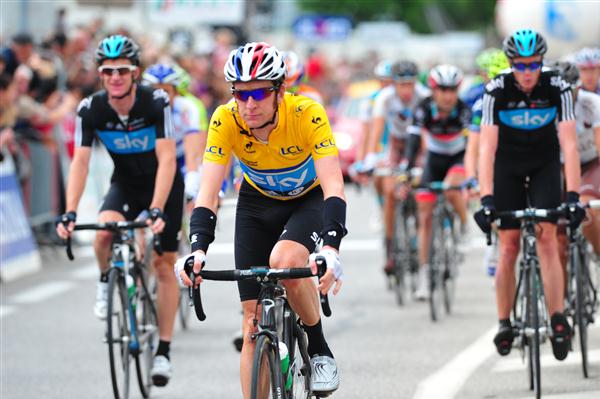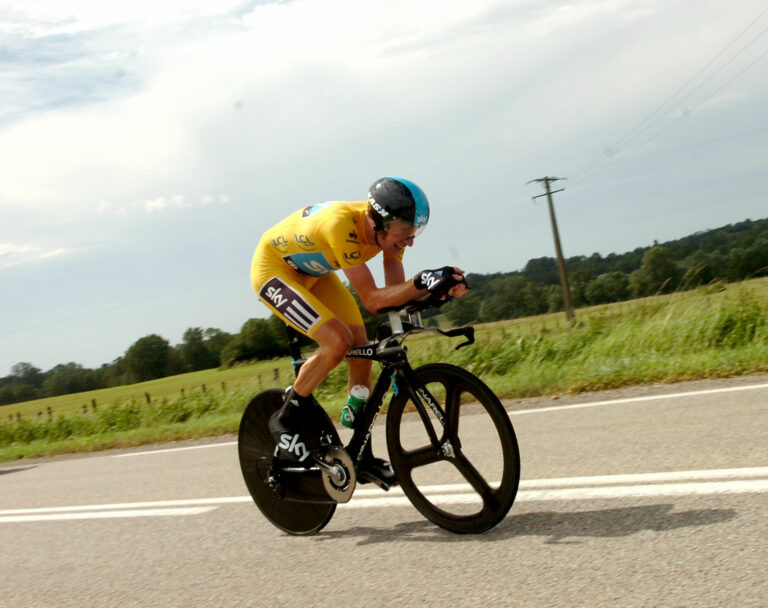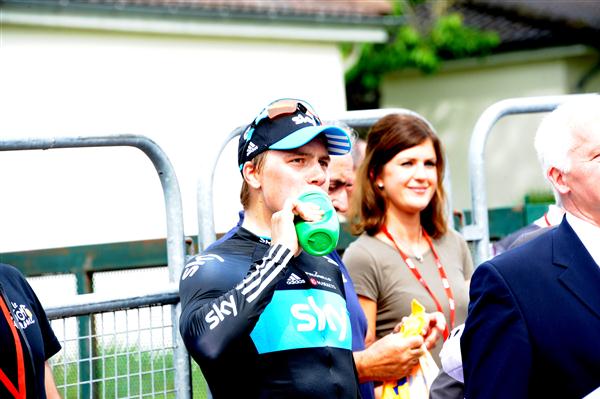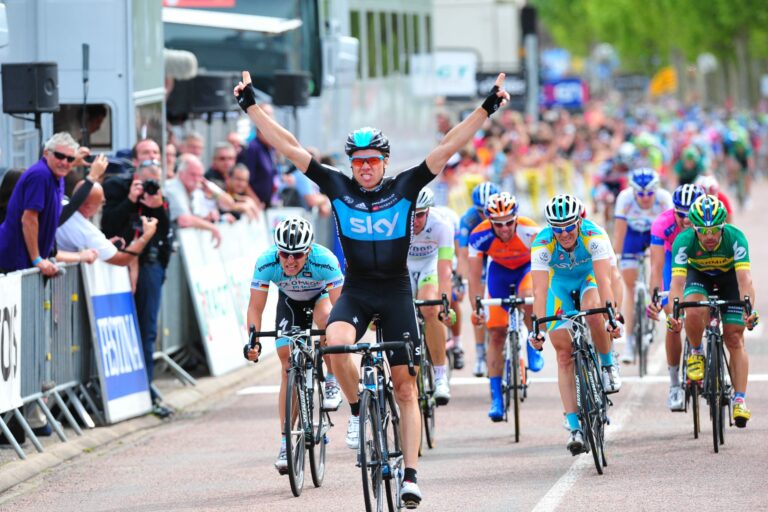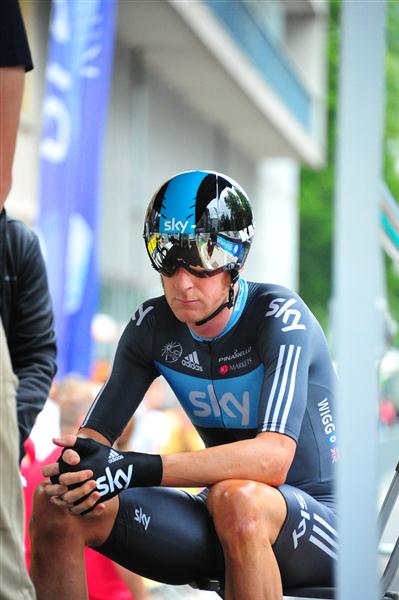An anonymous industrial estate seems far removed from the glamour of cycling’s elite WorldTour, but it is from just such a location that Team Sky’s technical hub serves some of the world’s best riders.
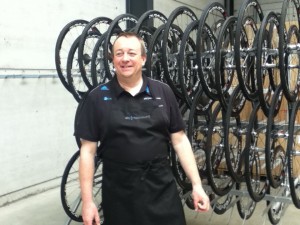
The service course, a vast warehouse and workshop in northern Belgium, is the nerve centre from which the bikes are deployed and where they are stored and prepared.
An entire wall of the facility is hung with framesets, sans wheels, but equipped with saddles, cockpits, groupsets, and chains. The Pinarello Dogmas and Graals are stored in alphabetical order; a surname and small, printed flag denoting the place in which each rider’s frame should be hung.
Empty pegs include those of Cavendish and Flecha, their occupants engaged in Italy. One of the pegs allotted to Alex Dowsett holds his new time trial machine. The owner arrives later and, obviously pleased with his new acquisition, finished in the colours of British national time trial champion, reveals it is the first time he has encountered it. Another red, white and blue Graal, this one belonging to the previous holder of Dowsett’s title, hangs at the other end of the rack on a peg similarly labeled with a union jack but bearing the name Wiggins.
Adjacent to the peg on which Wiggins’ former time trial machine hangs are racks of wheels, mostly Shimano Dura Ace C35s. Nearby, another rack holds the hoops ridden by at Team Sky the Classics: box section rims shod with wider tyres, some helpfully printed, ‘Paris-Roubaix’.
Each of Team Sky’s riders is allotted five bikes. With 28 riders on team, the service course, managed by the personable Andy Verrall, looks after 140 bikes.
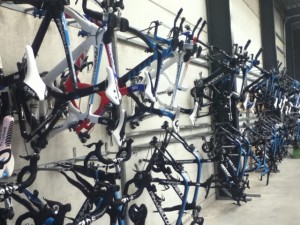
This is the first of an impressive set of figures reeled off by Verrall, a man clearly at the heart of the facility. The team gets through 25,000 bidons each year; rows and rows of kit boxes, again marked with the rider’s name and a small flag, are stored in another huge area of racking.
Running the service course is a year-round operation. Closed season is for the riders only, and even for them, is brief. The team leaves for the Tour Down Under on January 3 which requires Verrall and the mechanics to work through the Christmas break. “Then you’re just full gas, preparing for all the Classics races,” he says.
Our visit to the service course takes place in the second week of May, a period in which the squad for the Giro has been dispatched to Denmark, and seven riders and a small support crew have been equipped for a training camp in Tenerife.
But even in this relatively quiet period for the staff of the service course, as they prepare for the next block of stage races (Bayern Rundfahrt, and the Tours of Luxembourg and Norway among them), life is not without challenges. In the early hours of the morning of our visit, a support van stuck in gear caused the team bound for Tenerife to miss their flight, requiring a last minute search for replacement transfers.
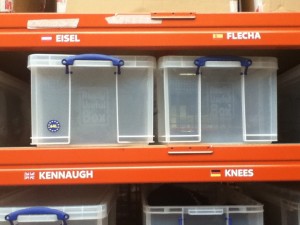
The late injury to Ben Swift that ruled the newly-crowned scratch race world champion out of the Giro had repercussions in Belgium. Equipment for replacement rider, Jeremy Hunt, had to be sent to Denmark at short notice. A masseur bound for the race on a delayed flight was called to Kotrijk and after several hours dispatched to Denmark with Hunt’s supplies.
It’s not unheard of for bikes to be sent to races with rival teams, says Verrall, nine of whom are based within a 20km radius of the Team Sky service course (a facility used last year by HTC-Highroad).
“It’s not central to the whole of Europe, but if you look where the races are, this is the best place to be,” says Verrall, who speaks of a loose camaraderie among the WorldTour teams based in the area.
An industrial unit in northern Belgium is figuratively, and, the Classics season aside, literally hundreds of miles from the races it serves. A television in the office is tuned to Eurosport, while the mechanics preparing bikes pause to watch the closing kilometres on a laptop on the work bench. On a recent Sunday, work stopped for Wiggins’ emphatic ride in the closing time trial of the Tour of Romandie. Text messages with news of podium finishes and other notable successes are sent to all members of the organization.
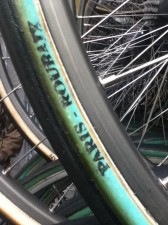
The riders are infrequent visitors to the service course, but today Dowsett and Michael Barry are here to ride out with the press, and the relationship between the men who rely on the efficiency of the service course is obviously warm. Fifteen of their colleagues are out at the moment, says Verrall, engaged at the Giro or the Tenerife training camp. The staff of the service course, the riders, and management of Team Sky meet once a year at an end of season get together in which Verrall hands over training bikes for the winter months ahead.
The enormous, slate grey service truck parked outside is one of two operated by the team and part of a 20-strong fleet run from the service course. Its wheel rims are polished to a high shine and the panels exposed by its expanding sides are finished in ‘Sky’ blue; further indications of the team’s attention to detail with which its principal has become synonymous. The truck carries 56 wheelsets, 36 bikes, five groupsets, and numerous cassettes to each race. “When it’s cold, we can keep warm,” says Alan Williams, one of the team’s eight mechanics. “The philosophy of the team is to give the best for the riders and they want us to have the best conditions to work in. It makes us a little bit soft sometimes. We need to get outside and harden up a little bit,” he jokes.
Williams shows us around the truck, his mobile office for 200 days a year, which he shares with three other mechanics at the cobbled Monuments and Grand Tours. A team of three mechanics is assigned to the Ardennes Classics; a two-man team attends the smaller stage races. He enjoys working the Classics, thriving on the extra details required (double lever hoods this year for Juan Antonio Flecha, newly recovered from a hand broken in training) and the vastly increased chance of ‘flying out’ of the team car to the mechanical aid a stricken rider. “Doing a Grand Tour is doing a Grand Tour,” he adds. Working on cycling’s biggest races clearly holds the same significance for mechanics as riders.
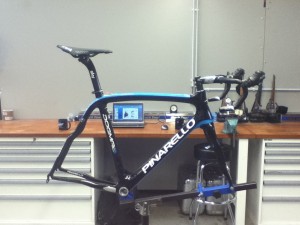
A typical working day for a mechanic at a Grand Tour begins with breakfast at 6am and ends nearly 18 hours later. The first task of the day is to ‘gas’ the bikes (pump up the tyres), before getting the cars ready to leave for the stage.
The mechanics arrive up to 90 minutes before the start and finish the stage with the riders four or five hours later. “Then it’s a transfer a back and all hands on deck.”
Long transfers between stages are an additional drain; the journey from Denmark to Italy for the fourth stage of the Giro (“that would have been a hell of a day”) was one Williams is not sorry to have missed. “They say it’s a rest day; it’s a rest day for the riders, but not for the staff. There is no rest day for staff,” he remarks with a wry smile.
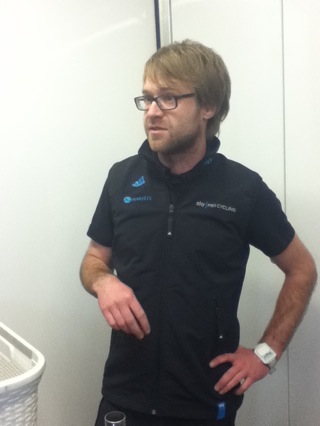
While a camaraderie exists between the riders and their mechanics, and banter is a frequent mode of discourse, a line remains, says Williams. The mechanics work in service of the athletes, to provide them with the tools they require for an extremely demanding job, one that routinely takes them to exhaustion. His preference is for riders who know what they like. “Bradley knows exactly what he wants,” he says. “He comes in the evening and says I want this, this, and this. You don’t get a complaint the next morning because he knows what he wants.”
The service course gives an insight into the scale of the Team Sky operation and its ingrained professionalism. Perhaps only Formula One teams face similar logistical challenges to cycling’s WorldTour teams, competing for two-thirds of the year in locations across the globe. Little seems left to chance by Verrall, technical director Carsten Jepesen, or the team’s eight mechanics. The gains offered by their professionalism seem more than marginal.
RoadCyclingUK were guests of Shimano and Team Sky. Many thanks to both.

